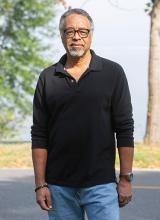When Robert Crutchfield, who retired as a professor emeritus in 2016 after almost four decades in the Department of Sociology, was invited to join the Board of Commissioners for the Seattle Housing Authority (SHA), he couldn’t say no. It was a full-circle moment.
“For me, it was pretty special because I grew up in housing projects in Pittsburgh,” he says. “I was honored to be asked and happy to serve in the role. It was also a chance for me to bring what I knew from an academic setting in service to the community.”
The board’s work is focused on supporting the SHA’s executive staff and making decisions around budgets and investments. Its ultimate goal is to do everything it can to expand the amount of housing that is available for low-income people in Seattle.
In addition to serving the local community, Crutchfield is the chair of the Committee on Law & Justice (CLAJ) for the National Academies of Science, Engineering & Medicine. CLAJ is an all-volunteer group of academic experts from across the country responsible for bringing scientific input to important government, federal and local policies on crime, law and justice. A longtime priority for the group is getting a study conducted on racial and ethnic disparities in the criminal justice system and what can be done about it.
“Our job is to find the people who are most knowledgeable in that area, who have the best thinking about what we should be doing, and get that information to practitioners, policy makers and scholars,” he says.
Crutchfield is also on the steering committee for the Racial Democracy Crime & Justice Network, which provides mentorship to young faculty members of color from across the country who are studying issues of race, crime and justice. It’s a National Science Foundation-funded effort to continue to diversify the professoriate nationwide.
“I think staying involved and keeping a scholarly life alive and going gives me value, gives me something,” Crutchfield says. “I get as much as I give for a lot of these things.”
View full original article at University of Washington Magazine
